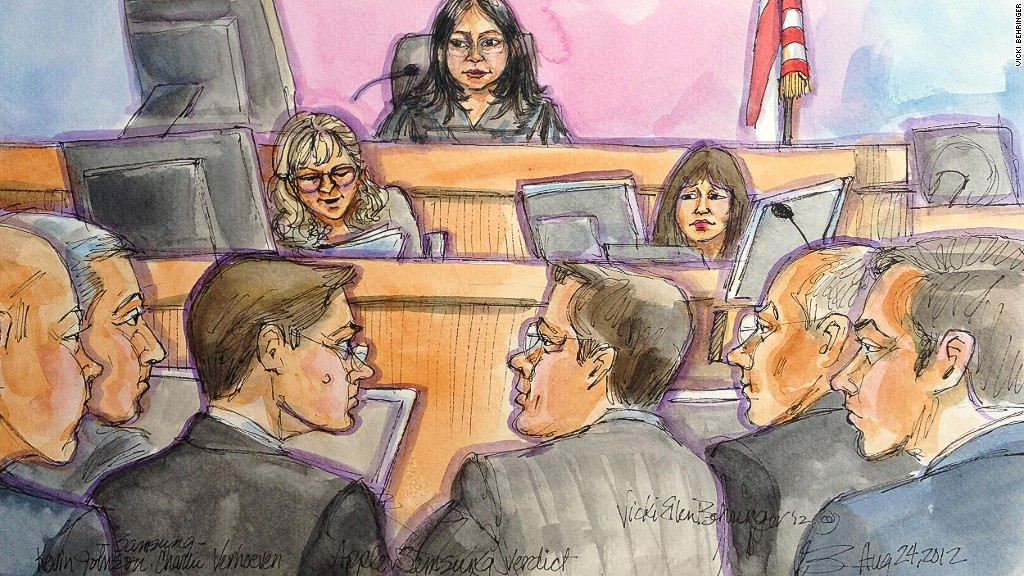
A jury awarded Apple most of what it wanted from Samsung in its historic patent battle, but the war is hardly over.
Both Samsung and Apple (AAPL) want at least some of the jury's verdict overturned, and a hearing will be held on Sept. 20 to review all the post-trial gripes, quibbles and motions. Included in the Sept. 20 hearing: Apple's request for an injunction against eight of the 21 Samsung devices that infringed its patents. If granted, Samsung could be forced to take those gadgets off the market.
After being dealt a near worst-case scenario verdict, Samsung's lawyers will likely try a simple argument: no reasonable jury would have reached such a decision. Such a motion is standard procedure in these kinds of cases and they are almost always dismissed.
But some legal experts say Samsung might have a shot: U.S. District Judge Lucy Koh issued 109 pages of instructions to the jury, complete with 84 separate directives on how to fill out a 20-page verdict form. But the jury returned a verdict after just three days of deliberation.
Plus, it's possible that some of the rulings were issued incorrectly. For instance, the jury initially awarded compensation to Apple for two Samsung smartphones that they said did not violate Apple's patents. That was quickly corrected in an amended verdict.
Another issue is any sign that the jury was out to send a message. Jury foreman Velvin Hogan told Reuters, "We wanted to make sure the message we sent was not just a slap on the wrist."
But the judge was clear in her instructions: "You should keep in mind that the damages you award are meant to compensate the patent holder and not to punish an infringer."
"That's why I don't think this jury's ruling will stand," said Duke law professor Mark Webbink on his Groklaw blog. "This story is far from over."
Related story: 19 incredible Apple secrets revealed in court
Apple may have some parts of the verdict to complain about as well.
Before the trial began, Judge Koh issued a preliminary injunction against a Samsung Galaxy tablet, noting that it was "virtually indistinguishable" from Apple's iPad. The injunction meant that Samsung could no longer sell the device in the United States.
Yet the jury found that Samsung's tablet did not violate any of Apple's patents.
"Judge Koh appears to be of the mindset that the accused Samsung tablet easily meets the 'substantially the same' infringement standard," said Chris Carani, a design patent attorney at McAndrews, Held & Malloy. "Apple has a greater chance than usual to succeed in convincing Judge Koh to play this extraordinary trump card."
Related story: What the Apple-Samsung verdict means for your smartphone
If the judge decides the jury's verdict was valid, she will then weigh a host of other issues.
One of the first will be Apple's injunction request against Samsung's devices. That's likely to be granted, most legal experts agree, but it could also easily be held off by a higher court.
Samsung will likely appeal the whole case if the judge doesn't overturn the jury's verdict, and as part of that appeal, the company will ask that an injunction be "stayed," or postponed. Given the impact an injunction would have on the overall smartphone market, a stay would likely be granted, said Mike Pegues, a patent attorney with Bracewell & Giuliani.
An appeal typically takes a year to be heard, but given this case's significance, most legal experts have said that an appeal will be heard in a matter of just a few months.
After that ruling is handed down, that should be the final word: The Supreme Court hasn't heard a design patent case in 141 years, and it won't likely start with this one.
"This is a high-profile case, but I don't know that I see a unique issue in patent law that's been presented by this case," said Michael Kasdan, partner at Amster Rothstein & Ebenstein.

